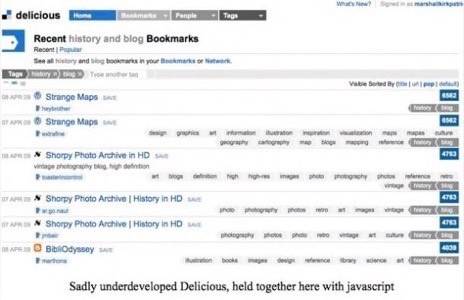Yahoo bought popular social bookmarking service Delicous three and a half years ago and it’s just now making moves to allow outsiders more access to the incredible data that’s stored there. The company announced this morning that the Yahoo BOSS (Build Your Own Search Service) platform can now pull in Delicious bookmarking history and top tags for any URL that’s been bookmarked two or more times.

Make no mistake about it, the vast majority of people on the web still have no idea that they can save their bookmarks outside their browsers. Yahoo has done a terrible job leveraging and growing this incredible database of user-categorized links of interest. Now the company is giving developers an opportunity to do so. Why is this important? Read on for some examples of what’s now possible thanks to BOSS/Delicious integration.
Two calls for Delicious data are now supported inside BOSS: the number of times a URL has been bookmarked and the top tags that users have applied to categorize that URL. Delicious has its own API, but it’s not as helpful as this integration with BOSS is.

BOSS is a technology that allows any website to use the Yahoo index and search processing power to build a topic-specific search engine on their own site. What could BOSS plus Delicious look like?
Some query types we can imagine being made possible by this integration are:
* I do a news search for a topic like the Textron buy-out or golfer Ross Fisher (two hot search terms today) and BOSS + Delicious shows me which URLs in my list of search results have been tagged “analysis” the most, or “biography.”
* Search an index of food blogs for recipes and tell me which of them have been bookmarked the most and have been tagged “Mediterranean” and “vegetarian.” The words Mediterranean and vegetarian may not appear anywhere in the text of the recipe, but human readers can recognize the recipe as fitting into both those categories and tag it as such when bookmarking it.
* Look up the links that my blog commenters post along with their comments and show me the top tags that other people have used to categorize those links. Perhaps, more marketers than engineers commented on my last blog post. I’d like to know that. Perhaps, I’ve had an influx of teachers, preachers or veterinarians commenting on my blog lately. Who wouldn’t want to see that kind of data?
These are just a few examples of the kinds of data that we can imagine BOSS + Delicious offering up. We’re sure readers can noodle just a bit on permutations of URL, times bookmarked, and top tags in order to come up with all kinds of other scenarios. Any time you’ve got millions of people saying “this link is important to me and these are the words I’d use to describe it” then that’s really valuable information to be able to access programmatically.
Now imagine what could happen if Yahoo helped more people discover social bookmarking and opened up even more access to that data. It’s absolutely tragic that this hasn’t happened yet, but perhaps a little BOSS action is the beginning. If knowledge and information are value, then Yahoo has taken a small pipe connected to a potentially huge reservoir of black gold and let it just run down the drain, unused for the last three years. Yahoo adopted a baby with the potential to grow into an incredible adult and then forgot to feed and care for it for three years. It’s quite upsetting.
It would be great if Delicious saw continued development in directions that supported this data-centric approach of leveraging crowdsourced attention signals. We’re not sure how much hope for that is warranted though, given that so little progress has been made in that direction so far.
Disclosures: The author is a member of a Yahoo! Product Advisory Council and has multiple consulting clients in or around the social bookmarking sector.

















